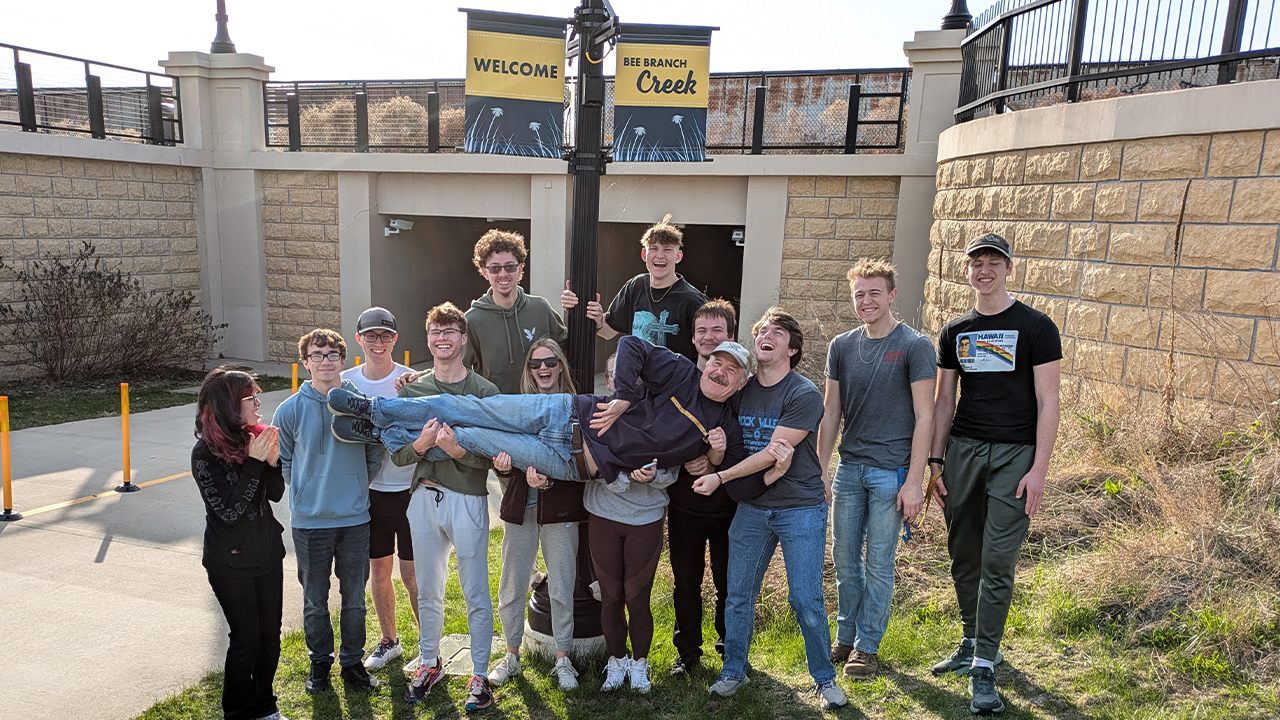
Students from the University of Wisconsin-Platteville's second cohort of the Sociocultural and Place-Aware Civil and Environmental Scholars (SPACES) program recently took part in a transformative field trip to Dubuque, Iowa, as part of their second semester, first-year seminar. The SPACES program is supported by a National Science Foundation scholarship grant awarded to civil and environmental engineering students and is designed to expand students’ sense of identity as engineers while fostering a community-oriented, place-based approach to problem-solving.
The visit to Dubuque’s Bee Branch Creek Restoration Project offered a firsthand look at how engineering can meaningfully serve both environmental and community needs. The tour was led by Deron Muehring from the City of Dubuque and Mike Jansen, a 1987 UW-Platteville civil and environmental engineering alumnus, now with Strand Associates.
The project was initiated in response to chronic flooding that plagued neighborhoods along a buried section of Bee Branch Creek. With urban development upstream increasing stormwater runoff, the original culvert could no longer handle the volume, resulting in extensive and frequent flooding of residential areas. The long-term solution? An ambitious project to “daylight” the stream—returning it to a more natural state and transforming the surrounding floodplain into a beautiful, functional linear parkway.
Rather than defaulting to a traditional engineered solution like a concrete or rip-rap-lined channel, the city chose a forward-thinking, community-focused design. The restored area now includes sidewalks, green space and other public amenities that not only manage stormwater but also enhance the quality of life for residents.
Students were deeply inspired by the visit. Reflections captured after the field trip highlighted their increased understanding of how civil and environmental engineering can reshape communities:
- “This whole project highlights the impact engineers have on communities. They took something that was a complete disaster, fixed it up, and made it so much better.”
- “It was informative, pertained to what we want and need to learn, and it had an interactive opportunity with it, in terms of getting to talk to the professionals that designed and did the leg work for the project.”
- “I gained a clearer understanding of how engineering can profoundly affect the character of a neighborhood and how the engineering decisions made can influence how people use a space.”
- “I really enjoy projects that serve to not only solve a problem but to also serve the community and environment around it—and the Bee Branch does exactly that.”
This field experience underscores the SPACES program’s mission: to cultivate a new generation of civil and environmental engineers who are technically skilled, culturally aware and deeply connected to the communities they serve.
For more information on the SPACES grant, visit Civil and Environmental Engineering Scholarship Program.
To learn more about the Bee Branch Creek Restoration Project, visit https://www.cityofdubuque.org/804/Bee-Branch-Creek-Restoration.